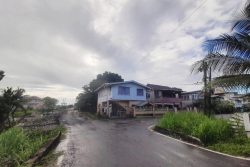Going forward, Caribbean Community (CARICOM) governments now run the risk of being unacceptably delinquent in the execution of their responsibility to the countries of the region in the wake of Beryl’s rampage and the toll it has taken on what, in some parts of the region, had already been an existing serious food security deficit. Beryl’s onslaught came against the backdrop of the region’s acute awareness of its food security frailties and what appeared to be it (the region) removing its foot from the accelerator insofar as the much vaunted food security plan was concerned. While a trip down the ‘blame game’ road will certainly not remedy the situation, it can hardly hurt for us to have the two regional ‘lead Heads’ – Prime Minister Mottley and President Ali – fill us in on just where we are in the matter of the promised establishment of a Regional Food Security Terminal, the announcement of which was made in excess of a year ago.
Significantly, there appeared to have occurred a decline in momentum, ironically, in the setting up of a Regional Food Security Terminal against the backdrop of a stated concern articulated by organizations like the Food and Agriculture Organization (FAO) and the World Food Programme (WFP) that the region’s food security credentials were being eroded by a combination of an overall increasing population, on the one hand and, on the other, a painfully obvious declining ability to properly feed itself in light of the fragile food production bona fides of some of the smaller territories of the region. We are now two years and more beyond the May 2022 regional commitment to a food security plan and, given the very recent intervention of Hurricane Beryl, it can now be said that, as a region, we are now worse off (how much worse off it is difficult to tell at this stage) than we were two years ago.
Since nothing meaningful has been done to shore up the overall food resources of the region and since we have now been ‘caught out’ by Beryl, the way forward has to start with the ‘lead Heads’ and their ‘front men/women’ on the Regional Food Security Plan providing us with a thorough and unvarnished briefing on just where we are at this juncture. Unfortunately, a proverbial show of hands in the face of culpability is not one of the favoured propensities of Caribbean leaders so that what now obtains in the face of a regional food security challenge is seemingly, a studied pretense that the lapses that took place in the process of seeking to execute the Regional Food Security Plan never really happened at all. Indeed, back in 2023, when it seemed that the much touted Food Security Terminal was simply not moving at all, neither the two ‘lead heads,’ their respective ministers nor the CARICOM Secretariat sought to provide the region as a whole with what one might call a plausible explanation.
The recent rampage of Hurricane Beryl and its impact on agriculture in those CARICOM member countries whose food sufficiency bona fides and export earnings – Jamaica being, in the latter instance, the likely most affected – now requires that the region, as a whole, re-apply itself with an enhanced sense of urgency to secure its regional food bona fides as agreed to in Guyana back in May 2022 at a regional investment forum. No less important, is that those functionaries responsible for the execution of food security be far more accountable than they have been up to this time with providing the people of the region with periodic credible briefings on how the plan is proceeding. Here it should be said that open, accurate and unambiguous disclosure is not always a favoured regional inclination.
While a great deal of regional fervour appeared to have been invested in the undertaking, which the Heads of Government of Guyana and Barbados were assigned to spearhead, it is altogether fair to say that after the undertaking had gotten out of the blocks with due haste and with a generous dose of regional hoopla it has slowed significantly at the hurdle of the creation of Food Security Terminal that had been identified as one of the focal points of the overarching assignment. It is therefore altogether fair to say that some of the logistical aspects of the initiative to boost the region’s food security bona fides were always bound to be more extended in their execution than others, though it seemed that there had always been an unwritten understanding that given the urgency of the food security deficiency in the region that had earlier been cited by the UN World Food Programme, among other agencies, and which it seemed, had attached a particular dimension of urgency to the pursuit of remedial action, that the overall execution of the undertaking would have been anointed with a generous degree of determination than turned out to be the case. Frankly, it was obvious that ‘urgency’ ought to have been the order of the day particularly since it was no secret that the food security bona fides of some of the smaller territories were threadbare to the point of amounting to crisis in some cases.
As far as this newspaper is concerned, to put it bluntly, the way forward needs to be preceded by a comprehensive, publicly available assessment, ratified by the ‘Lead Heads’ as to where we are at this time. Anything different will amount to further fudging of the issue.





